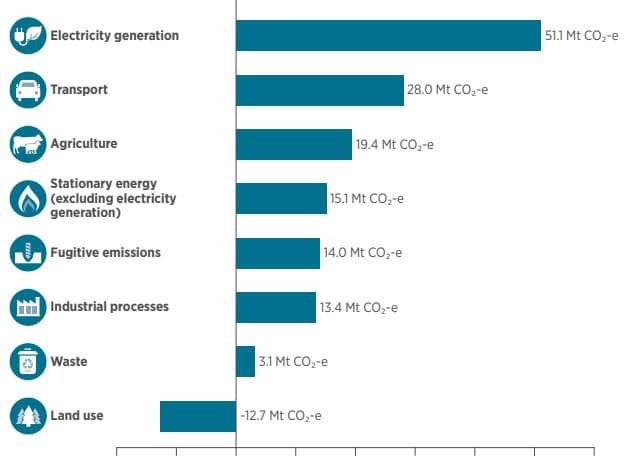Net Zero Plan Stage 1: How the deployment of fast charging infrastructure will reduce global warming

Carbon dioxide emitted from vehicles has been identified by the NSW government as the second biggest contributor to climate change.
Renewable electricity generation strategies are the leading priority for the NSW Government as the graph above highlights due to its greenhouse gas emission. Transport is highlighted as the 2nd highest contributor with the government looking into strategies that can reduce carbon dioxide emitted by vehicles in NSW. Luckily, the leading solution for this is electric vehicles (EVs), as the greenhouse emissions emitted from EVs is significantly reduced when compared to a traditional internal combustion engine (ICE). Australia has a comparatively low uptake of electric vehicles when compared to the rest of the world, as our EV sales rate is ranked 32 out of the 36 countries in the OECD. One of the reasons why this is the case in Australia is the lack of electric vehicle charging options as 30% of households do not currently have access to a dedicated EV charger. This is why the NSW government has addressed the need to install more fast charging stations in NSW. When compared to the leaders in electric vehicles Norway, New South wales is significantly behind, as Norway has 13,000 compared to NSW’s 400.
To understand fast charging, one must refer to the three-level system of charging. Level one AC charging is referred to 10/15-amp portable chargers that plug into a standard domestic power point and can charge a full battery electric vehicle in 20-40 hours. Due to the significant time it takes to fully recharge your vehicle, this is not referred to as a fast charger. Level two AC charging refers to the dedicated charging station that can be single phase or three phase of power and ranges from 16amps to 32amps per phase. These level 2 AC chargers are often seen in workplaces, fleets and residential areas. These are the most cost-effective charging solution as it does not require an expensive initial investment to install. These chargers can fully recharge your vehicle overnight or after a 5-10-hour period depending on the vehicle and the power of the charger. Australia needs to install more of these chargers in new residential and commercial areas to ensure that Australians can charge their cars on a regular basis. This would ensure their cars are consistently charged and would save consumers in paying thousands of dollars in installation fees.
The Direct Current (DC) charger refers to the ultra-quick charging stations that can fully charge a vehicle in 30 minutes to an hour. These units may charge quickly but are very expensive to run and to install due to the power and network upgrades. These are usually placed in highway stops, or more commonly next to service stations to allow for longer distance driving. A DC fast charger is needed and when there is a limited number of chargers available and rapid charging is essential. Australia needs to install more of these charging units to ensure efficiency for fleet operations, or to allow for electric vehicle travel across the country.
We have covered the benefits of both AC and DC charging on a previous blog post
https://evse.com.au/blog/electricvehicledccharging/
DC charging networks available in Australia
NSW currently has DC charging networks run by Tesla, NRMA and other leading companies. The NRMA created a network of 40 DC chargers in NSW and will continue to expand on this network. These chargers are free for their members and the NRMA believes that this will cover 95% of members road trips, as their chargers are located all over regional NSW. Tesla have chargers located all over Australia and vary from AC to DC charging. The downside to these Tesla chargers is that they only charge Tesla vehicles, which can be frustrating for non tesla EV owners. This is an issue that we often see occur in AC chargers, as a workplace or an apartment will install a series of Tesla chargers that do not charge every vehicle on the market. For AC chargers that can charge every car on the Australian market please refer to the link below.
Universal AC charging options
https://evse.com.au/product-category/commercial-chargers/
Universal DC charging options
https://evse.com.au/product-category/dc-ev-charging/
Installing electric vehicle Infrastructure is vital in Australia’s journey to reduce its carbon footprint. As the Net Zero Plan identifies, vehicle emissions are the second biggest omitted of carbon dioxide. To incentivise consumers to purchase electric vehicles more charging stations are required for the public to alleviate range anxiety. This includes AC level 2 charging stations that can be used for commercial, residential and smaller fleet operations, as well as DC charging stations that can charge electric vehicles in remote areas, or can power a large fleet operation.
For more information on how you can help the government achieve its Net Zero goals of increasing electric vehicle infrastructure, please call EVSE on 1300 406 210.


